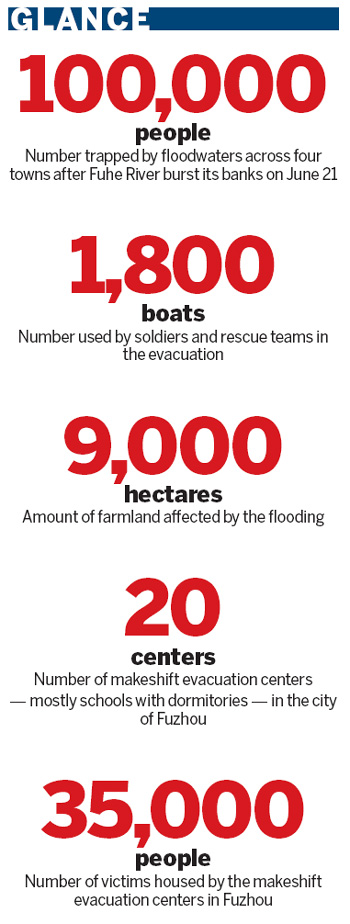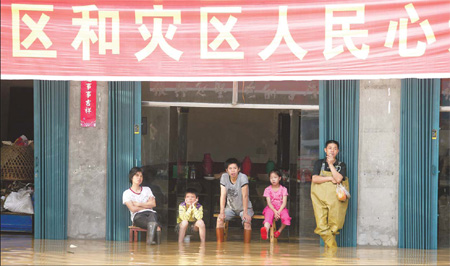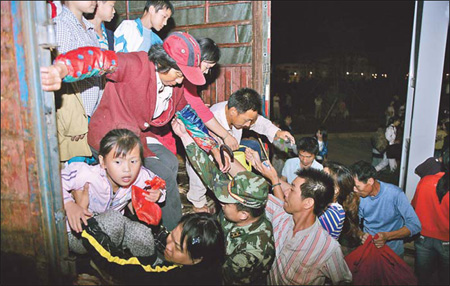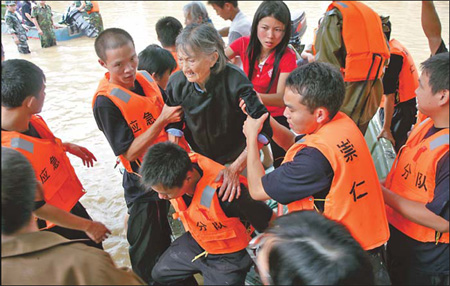Special
Farmers choose to live or die with their homes
By Duan Yan (China Daily)
Updated: 2010-06-28 07:55
 |
Large Medium Small |
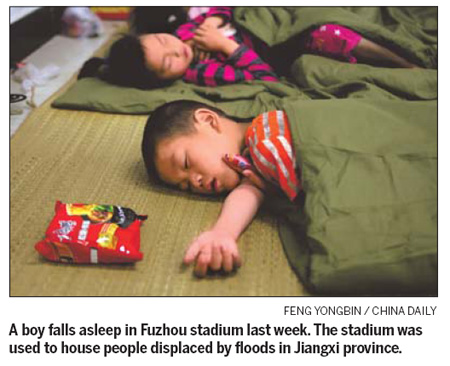
Flood victims who refused to quit their houses hamper relief efforts. Duan Yan reports from Jiangxi.
He Yin, 14, and her 6-year-old brother He Yu had been trapped in their flooded home in Changkai town for more than 24 hours when their uncle finally arrived to rescue them.
After driving for 400 km from the city of Ganzhou, Zhu Lianfa had guided one of the speedboats being used to evacuate residents straight to the children's doorstep - yet they were still reluctant to leave.
"I want to stay with my mother," said He Yin, her eyes welling with tears.
"We still have many items at home, like blankets, towels and other daily supplies," she protested as she boarded the boat, leaving her parents to follow on later.
"Adults can come later," said Zhu as he held He Yu in his arms. The boy was suffering a high fever and needed medical attention.
"Children are the priority. They need to be somewhere safe that has clean drinking water."
|
|
More than 100,000 people in four towns were trapped by floodwaters when Fuhe River burst its banks on June 21, puncturing a large hole in a protective dike 2 km upstream of Changkai in eastern Jiangxi province. With more torrential rain forecast within days, thousands of soldiers and rescue workers were quickly deployed to evacuate residents using 1,800 boats before the next wave of floods hit.
Such a mammoth task with limited resources would pose a headache for any authorities, yet in Changkai it was a mission further complicated by the many people who refused to leave their homes.
Although He Yin could be accused of being a naive child, thousands of townsfolk, old and young, shared her belief that they would stand a better chance of protecting homes and businesses by staying put.
"I took one person by boat to his home as he said he wanted to save his family," said 20-year-old solider Wang Ji. "When we got there, he brought out several people and then he went back in and refused to come out.
"(This) just makes our rescue efforts all the more difficult," he said, sighing in frustration.
Like many of the soldiers, Wang is not from Jiangxi, so not only is he unfamiliar with the environment (the boats regularly hit low walls or become tangled in crops or bushes), he also could not understand the local dialect. Rescuers had to rely on local volunteers and cadres to help them.
When villagers refused to leave or attempted to jump out of the boats and return home, it was up to these volunteers to persuade them otherwise.
"It's going to rain and the water level is going to rise tomorrow. I can't come back to save you again," Liu Boqing, head of a village also called Changkai, shouted at a middle-aged man standing at the second-floor window of a house. After a few minutes of unsuccessful negotiation, the official signaled the solider to move on to the next area.
"I can't force him," said Liu shrugging. "For the time being we need to focus on getting elderly people and children out. If anything happens to him, though, it will be my responsibility."
Rescuers told China Daily that the time wasted on convincing people to go with them had resulted in missions that should have lasted two hours instead lasting sometimes more than three or four hours.
"These people are worried about their livestock, their television sets, their refrigerators," said Liu. "Many villagers here also make a living in construction and they are pretty sure that the buildings are not going to collapse."
You Meiqing, 23, who chose to stay at home with her 1-year-old son, insisted they were in no danger.
"If the flood gets worse, I'll just move everything up to the next floor," said the housewife, whose husband works away from their hometown. She eventually agreed to move to an evacuation center.
Great escape
|
|
Foreseeing the problem, authorities sent letters to residents warning them about the flood dangers from the coming rain. But when it came to carrying out the rescue plan, soldiers and cadres said much of the resistance was from elderly people.
"We don't want to leave," said Wang Rixi, the 67-year-old gatekeeper at Changkai's elementary school, who lives with his wife, Liu Danglu, 61, and their two grandchildren. "We're fine here. We have plenty of rice and drinking water."
The family had been holed up in a second-floor classroom for several days by the time a rescue team arrived.
When asked if they were afraid, the two youngsters firmly shook their heads. Like other children in the town, this is their first flood experience as they are too young to remember the last time the dike was breached in 1982.
"My son and daughter-in-law (who work away) keep asking me to get out (of the flood zone) with the children but I'd rather stay," said Wang Rixi, who eventually relented and was carried to a boat on the shoulders of a soldier. In his hands were bags stuffed with blankets and clothes.
With power supplies and telephone lines disrupted by the deluge, residents working outside of the area found it difficult to get in touch with loved ones back home. Instead, they bombarded cadres with calls for information.
"People have called me many times to ask us to bring their relatives back," said village head Liu. "But when we get there, they refuse to leave."
Liu Yang, a 21-year-old college student from the East China Institute of Technology, who stood on a bank watching the evacuation, said he used to be a soldier but could understand why residents are reluctant to leave their homes.
|
|
"The chickens, cows and horses, even the blankets, they all mean a lot to these people," he said. "They can't just leave them there."
In one case, soldiers had to help a resident move his refrigerator upstairs before he would agree to leave. "Some villagers even asked us to ship their pigs out of the flood zone," said soldier Wang Ji.
Once out of the dangerous area, residents were transported to one of about 20 makeshift evacuations centers - mostly schools with dormitories - in Fuzhou, a city 20 km south of Changkai in Jiangxi.
Meteorological reports suggest the worst of the rain is over, but before people began to filter back to the affected towns over the weekend, the centers housed more than 35,000 flood victims. Many others stayed with relatives.
Each person was given mats to sleep on, blankets, food and drinking water. However, many of those evacuated said they were anxious to return home.
"Recent days have been sunny and the water level has dropped, so local villagers know the flood is retreating and can't wait to get back," said Bao Guohua, an official with Fuzhou Intermediate People's Court, who was helping with the evacuation.
"But it's not just about protecting property or money," said Wang Fuying, 45, whose house sits just beyond the flood zone in Changkai. "I'd definitely stay in my home. There are so many people (at the evacuation centers). It's not convenient to shower or go to the bathroom. And you have no idea how long you are going to stay there."
Work on repairing the damaged dike, which stretches for 347 meters, was blocked at 6:16 pm on Sunday, three days ahead of schedule, according to the Fuzhou flood control and drought relief office.
An official with the city's publicity department said no casualties have been reported from the flood and added that efforts to prevent the spread of an epidemic will begin this week. As residents return to clean up the mess, though, one of the biggest problems they face is salvaging the crops planted in 9,000 hectares of farmland that, for the last several days, was deep underwater.
